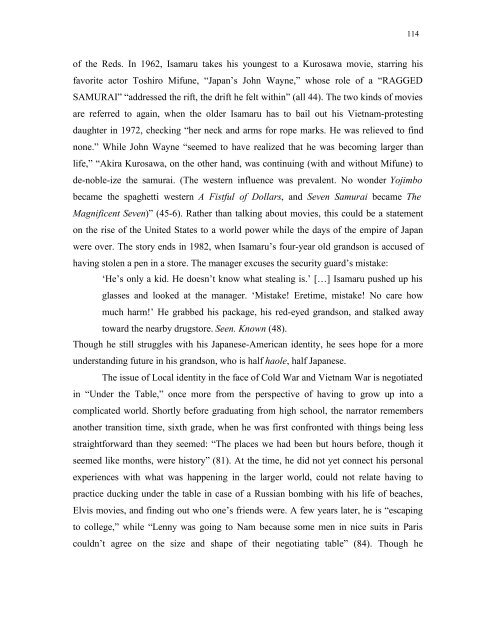A Paradise Lost - KOPS - Universität Konstanz
A Paradise Lost - KOPS - Universität Konstanz
A Paradise Lost - KOPS - Universität Konstanz
Create successful ePaper yourself
Turn your PDF publications into a flip-book with our unique Google optimized e-Paper software.
of the Reds. In 1962, Isamaru takes his youngest to a Kurosawa movie, starring his<br />
favorite actor Toshiro Mifune, “Japan’s John Wayne,” whose role of a “RAGGED<br />
SAMURAI” “addressed the rift, the drift he felt within” (all 44). The two kinds of movies<br />
are referred to again, when the older Isamaru has to bail out his Vietnam-protesting<br />
daughter in 1972, checking “her neck and arms for rope marks. He was relieved to find<br />
none.” While John Wayne “seemed to have realized that he was becoming larger than<br />
life,” “Akira Kurosawa, on the other hand, was continuing (with and without Mifune) to<br />
de-noble-ize the samurai. (The western influence was prevalent. No wonder Yojimbo<br />
became the spaghetti western A Fistful of Dollars, and Seven Samurai became The<br />
Magnificent Seven)” (45-6). Rather than talking about movies, this could be a statement<br />
on the rise of the United States to a world power while the days of the empire of Japan<br />
were over. The story ends in 1982, when Isamaru’s four-year old grandson is accused of<br />
having stolen a pen in a store. The manager excuses the security guard’s mistake:<br />
‘He’s only a kid. He doesn’t know what stealing is.’ […] Isamaru pushed up his<br />
glasses and looked at the manager. ‘Mistake! Eretime, mistake! No care how<br />
much harm!’ He grabbed his package, his red-eyed grandson, and stalked away<br />
toward the nearby drugstore. Seen. Known (48).<br />
Though he still struggles with his Japanese-American identity, he sees hope for a more<br />
understanding future in his grandson, who is half haole, half Japanese.<br />
The issue of Local identity in the face of Cold War and Vietnam War is negotiated<br />
in “Under the Table,” once more from the perspective of having to grow up into a<br />
complicated world. Shortly before graduating from high school, the narrator remembers<br />
another transition time, sixth grade, when he was first confronted with things being less<br />
straightforward than they seemed: “The places we had been but hours before, though it<br />
seemed like months, were history” (81). At the time, he did not yet connect his personal<br />
experiences with what was happening in the larger world, could not relate having to<br />
practice ducking under the table in case of a Russian bombing with his life of beaches,<br />
Elvis movies, and finding out who one’s friends were. A few years later, he is “escaping<br />
to college,” while “Lenny was going to Nam because some men in nice suits in Paris<br />
couldn’t agree on the size and shape of their negotiating table” (84). Though he<br />
114

















